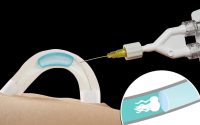Flavonoid-rich foods, drinks linked to lower diabetes risk
This news may make your day matcha better.
Consuming a lot of flavonoid-rich foods and drinks such as green tea, berries and apples can lower the risk of Type 2 diabetes, a new UK study finds.
113,097 participants underwent at least two 24-hour dietary assessments to determine their Flavodiet Score. Researchers were interested in their intake of black and green tea, red wine, apples, berries, grapes, oranges (including satsumas), grapefruit, sweet peppers, onions and dark chocolate.

Flavonoids — chemical compounds found in fruits, vegetables and other plants — have been praised for their anticancer, antiviral, antibacterial, antioxidant and anti-inflammatory properties. There are six main types of flavonoids, which differ in their biological activity and how they are metabolized in the body.
The new study, published last week in the journal Nutrition & Diabetes, found that consuming six servings of flavonoid-rich foods a day could reduce the risk of developing Type 2 diabetes by 28% compared with eating just one serving.
When excluding red wine from the analysis, six servings of flavonoid-rich foods were linked to a 26% lower risk of Type 2 diabetes.
Over 38 million Americans have diabetes — most of them have Type 2 diabetes. Risk factors include being overweight, over age 45 and physically inactive. Plant-based diets have been shown to cut the risk of Type 2 diabetes.
!["This study supports the current advice on increasing fruit consumption to reduce [Type 2 diabetes] risk, but points to a specific role for berries and apples," the study authors wrote.](https://nypost.com/wp-content/uploads/sites/2/2024/05/close-portrait-handful-delicious-red-82809419_66ed85.jpg?w=1024)
In the new study, four servings of tea a day lowered the diabetes risk by 21%; one serving of berries a day reduced it by 15%; and one serving of apples a day decreased it by 12%.
Researchers also noted the positive effect flavonoids had on sugar metabolism, inflammation and kidney and liver function.
“This study supports the current advice on increasing fruit consumption to reduce [Type 2 diabetes] risk, but points to a specific role for berries and apples,” the authors wrote.
“Encouraging an achievable increase in habitual intake of specific flavonoid-rich foods and beverages, namely tea, berries, and apples may lower [the diabetes] risk,” they added.
Registered dietitian Megan Hilbert, who was not involved in the study, noted that these “findings can play a huge role in educating patients on dietary recommendations.”
“What I really enjoyed about this study is that different flavonoids were compared and the data showed certain flavonoids to have a larger impact on reductions in diabetes, and certain foods in particular seemed to have a more protective effect than others,” she told MedicalNewsToday.


